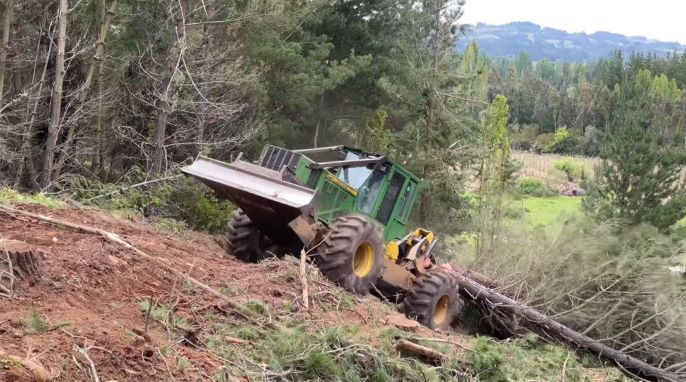The project was awarded to Dr. Marco Contreras, an academic from the Faculty of Forest Sciences and Natural Resources at the Universidad Autónoma de Chile. Approximately 100 contractor companies and 1,750 registered forestry consultants could benefit from this advancement.
The main objective of the Fondef IDeA project, led by Dr. Marco Contreras, an academic from the Institute of Forests and Society, is to minimize logging costs and soil impacts caused by heavy machinery traffic on skid trails in forestry operations. The initiative, which addresses a complex challenge for the country's forestry sector, is titled: "Development of software for the automated design of skid trails to minimize logging costs and soil impacts in operations with terrestrial harvesting systems."
The issue identified by the academic relates to skid trails in forestry operations and terrestrial logging equipment, considering factors such as time, productivity, and operational harvesting costs. "The high traffic of logging equipment on skid trails causes soil impacts, such as compaction, displacement, and rutting, which over time increase surface runoff and lead to erosion," explained Dr. Contreras. These impacts occur after the first passes of logging equipment, regardless of soil type, forest, or the equipment itself.
Addressing this problem is particularly relevant in our country, as Chile harvests approximately 90,000 hectares of planted forests annually, producing 45 million m³ of wood to supply the forestry industry.
Consequently, the target market for this software includes a dozen forestry companies managing the 2.4 million hectares of planted forests in Chile; around 100 contractor companies carrying out harvesting activities; and the 1,750 forestry consultants registered with CONAF as of 2020.
The design of skid trail networks has not been addressed by the scientific community, with only a few applied methods available for their design. However, according to the academic, these studies only provide proof-of-concept for solution methodologies, which have not been implemented in a computational tool for commercial use.
Along with designing highly productive, low-impact terrestrial mechanized harvesting operations, this project has other specific objectives, including developing predictive models for logging costs and soil impacts caused by terrestrial harvesting systems in five representative soil types and harvesting technologies; creating software for the optimal design of skid trails that minimize logging costs and soil impacts with spatial representation of terrain and vegetation conditions; and finally, evaluating the economic and environmental benefits of the software compared to traditional skid trail design.
What will the software consist of?
The software will be a widely applicable tool for forestry harvesting operations with terrestrial systems under any terrain and forest conditions. Among its features, it will be standalone, distributable via an easy-to-install executable file, and compatible with existing computer systems commonly used by potential users. It will offer extensive input data availability, such as digital coverages and integrated databases, along with a user manual and documentation for spatial input data, data processing, and results.
It is worth noting that the project's advisory committee will include members from associated companies that will play a key role: Forestal Mininco S.A., Forestal Arauco S.A., and West Ingeniería Ltda., as well as representatives from CONAF, Acoforag, CERTFOR, and Aprobosque.
The research team for this initiative, in addition to its director, Dr. Marco Contreras, includes Dr. Andrés Iroumé (alternate director) and Dr. Óscar Thiers (researcher). It is also noteworthy that this study will support human capital development at undergraduate, postgraduate, and researcher levels (both junior and senior) at the Universidad Autónoma de Chile.







Comments (0)
No comments yet. Be the first to comment!
Leave a comment